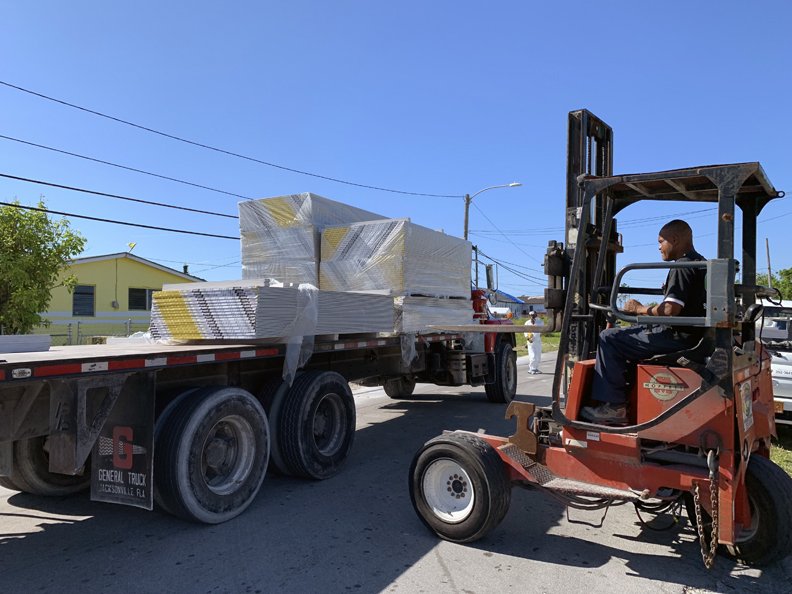Freeport, Grand Bahama – The Grand Bahama Disaster Relief Foundation, (GBDRF) in collaboration with its valued partners, has supported homeowners and helped restore hundreds of homes – and counting – in communities across Grand Bahama. Launched in November 2019, the Grand Bahama Home Repair Initiative was designed to assist homeowners in and around Freeport following the devastation of Hurricane Dorian. The program is a collaborative effort on the part of the Grand Bahama Disaster Relief Foundation (GBDRF) in partnership with various local and international partners including the Bahamas Red Cross, Rotary and SPB-USA.
Utilizing the Grand Bahama Port Authority’s (GBPA) geo-mapping system, the program successfully identified hundreds of storm-damaged properties in need of repairs. There are approximately twelve hundred applications currently under review with the Grand Bahama Disaster Relief Foundation.
“What we wanted to do was create a platform through which qualified local homeowners could easily access the aid being offered by the various NGOs and the GBDRF,” explained GBPA President and GBDRF Director Ian Rolle. “The GBDRF is the social outreach program for the Port, which was started after the passage of Hurricane Matthew in 2016. The Foundation challenged its relief partners to extend the reach of their various assistance efforts and come together to rebuild smartly and efficiently.”
As part of the program, it was agreed that all of the Island’s residential property owners whose properties had been damaged in Hurricane Dorian, irrespective of their citizenship status, would have their applications reviewed. Each successful applicant was then paired with an NGO that was best able to meet their specific repair needs. “We were happy to lend our assistance in whatever way we could,” noted Andrew Stofleth, Executive Director of SBP Bahamas. “So far, that has included our ongoing mold remediation work and now, with the help of the GBDRF and GBPA, we are able to shift our focus to those that most need assistance with home rebuilding.”
“To date, we’ve helped 63 homeowners and are currently rebuilding 30 homes,” said Stofleth. “The scopes of work have ranged from roof repairs to electrical and plumbing. All in all, we hope to help as many as 200 local homeowners rebuild.”
For Rotary, making contact with residents during door to door canvassing became a challenge in the aftermath of Hurricane Dorian as hundreds of homeowners had been displaced from their homes. This made their collaboration with the GBDRF on the repair initiative critical to their relief strategy.
“What we needed were details like the extent of the damage to various properties and what, if any, repairs had already been done,” noted James Sarles, GB Rotary Bahamas Disaster Relief Committee. “The program really gave us the kind of support on the ground to maximize our efforts and avoid the duplication of work, so we help more people.”
Since the initiative’s launch, Rotary has assisted over 200 homeowners on the island, with rebuilding funding coming from Rotary International. Rotary’s efforts are focused on the Hawksbill, Hudson and Pioneers Loop communities where volunteers have helped “muck and gut”, mold remediate and supplied sheetrock and building material to a great number of homes. Rotary has also provided building materials for up to 100 additional homeowners and has begun work on 100 homes in East Grand Bahama where they will assist with roof repairs and other major construction projects.
With the 2020 hurricane season already looming, partners of the Grand Bahama Home Repair Initiative are working expeditiously to ensure residents are prepared and back in safe housing. Over the next few weeks and months, the partnering groups are expected to complete additional repairs for eligible homeowners.
Homeowners interested in submitting an application for consideration are encouraged to visit the initiative’s webpage at http://gbrci.skywardcloud.com/ to complete the survey and begin the application process. The program is open to all homeowners, and consideration is given on a case-by-case basis with an emphasis on the neediest in our communities including retirees, single parents, multi-families, uninsured, under-insured and unemployed.
